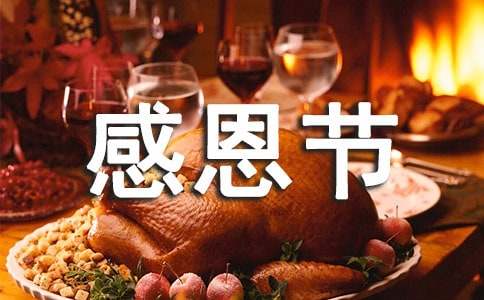- 相關(guān)推薦
美國的感恩節(jié)英語作文
感恩大地給了人們生存根基,養(yǎng)育了萬物。使地球生機(jī)怏然,植物茂盛動物繁衍人類昌盛,共同和諧生存。感恩節(jié),感謝大地給人類生活帶來五彩繽紛的世界!

【W(wǎng)hat is Thanksgiving?】
Thanksgiving is celebrated on the fourth Thursday of November in the United States. In Canada it is celebrated on the second Monday in October. In 2008, Thanksgiving is celebrated on November 26th in the US, and October 12th in Canada.
【The First Thanksgiving】
When we think of Thanksgiving today, images of football, pumpkin pie, parades, and turkey dinner complete with cranberry sauce come to mind, as well as plans for a Black Friday shopping spree the following day.
Of course none of these items were present back in 1621, when the Wampanoag people and the Pilgrims sat down together to give thanks for nature’s bounty. Although the celebrants at this particular meal didn’t even call it “Thanksgiving”, this particular harvest feast is the one after which we model our modern-day Thanksgiving celebrations.
People of both cultures had been giving thanks for the fall harvest and other gifts of nature for many centuries. It is interesting to note that the religious element, giving thanks to God, was not present at this particular celebration in 1621, even though the Pilgrims were devoutly religious. In fact, some early Pilgrim "thanksgiving days" were actually fasts rather than feasts. Imagine that!
However, the Native Americans had their own religious customs and beliefs. As a result, during this "first" Thanksgiving, Pilgrims and Native Americans did not focus on what was different between them, but instead concentrated on what they all shared. The two groups of people worked side by side to hunt and prepare food as equals and friends. Their friendship and cooperation was yet another thing for which to be thankful. Other feasts such as this one took place throughout the New World, where settlers and Native Americans worked together and celebrated together as one.
When we sit down to our Thanksgiving dinner, we honor a piece of early American history. The story of the Pilgrims and Native Americans serve as a good reminder for all of us to be thankful for what we have--no matter how much or how little.
【How Thanksgiving Became a Holiday】
After 1621, future Thanksgiving celebrations occurred at various times throughout the year. George Washington declared a feast of Thanksgiving in 1789, and presidents issued similar yearly proclamations after that. During the Civil War, poet Sarah Hale started a campaign to celebrate the holiday on the same day throughout the country.
President Abraham Lincoln saw it as a way to unite the country, and he in 1863 he proclaimed a national Thanksgiving celebration on the last Thursday in November. It was changed from the last Thursday to the third Thursday by Franklin Roosevelt in 1939 as a way to lengthen the Christmas shopping holiday. In 1941, Roosevelt finally changed the date to the fourth Thursday in November, proclaiming it a Federal holiday in 1941.
【Turkey: It's What's for Dinner】
When the Wampanoag people and the Colonists sat down to their three-day feast to give thanks, they dined on lobster, fish packed in salt, dried and smoked meats, and freshly caught wild game. They did not eat corn on the cob (as Indian corn was only good for making corn meal, not eating whole) or eat pumpkin pie or cranberry sauce since sugar, yams, or sweet potatoes had not yet been introduced to the New England region.
Turkey is the big centerpiece of most Thanksgiving celebrations across the United States. Since records of exactly what was eaten at that first celebration in 1621 are fuzzy at best, wild turkey may or may not have even been eaten at the feast.
The thing is, turkey was one of the staples of the settlers' diets at that time anyway, as turkeys were in great supply and were enjoyed for their eggs as well as their abundant meat. So, even if the feathered bird wasn't there at the first Thanksgiving, the turkey quickly became a fixture at future tables.
Today, many families opt instead for a roast goose (which was almost definitely present at the first feast), a ham (which was almost definitely not present), or the new "gourmet" tradition of turducken (a turkey stuffed with a duck that's stuffed with a chicken).
Thanksgiving is one of the few feasts where even the vegetarians can go home full without much modification of the standard menu. Leave out the roast turkey and you still have sweet potatoes, stuffing, corn, cranberry sauce, apple and pumpkin pie, roast squash, brussels sprouts and a host of other seasonal sides and desserts to pig out on. Of course, you can always add Tofurkey (turkey-flavored tofu) or another meat substitute for the non-carnivores and turkey-pardoners of the group.
【美國的感恩節(jié)英語作文】相關(guān)文章:
美國感恩節(jié)吃什么08-22
美國感恩節(jié)的由來英文09-19
美國留學(xué)英語作文(精選17篇)07-21
2016年美國感恩節(jié)是幾月幾號08-04
美國博士留學(xué)英語要求09-13
感恩節(jié)的英語作文10-02
美國感恩節(jié)介紹英文手抄報06-23
英語小說閱讀《美國悲劇》節(jié)選10-29
介紹感恩節(jié)的英語作文09-23